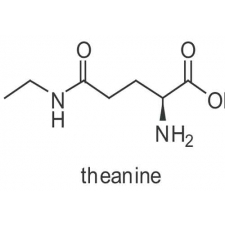Theanine is a type of amino acid that occurs naturally in tea. It has a mild neurotransmitter function, and can induce relaxation, enhance cognition, and improve sleep. Most regulatory agencies consider theanine to be safe, though the effects of high doses are still being investigated.

What is Theanine?
Theanine is an amino acid, a small organic molecule similar to those that form the building blocks of proteins. Structurally, it is very similar to the amino acid glutamate, an important neurotransmitter. It has a high bioavailability and is readily absorbed by your intestines. It is also able to cross the blood-brain barrier.1 Specific types of plants and fungi produce theanine, particularly the cultivated tea plant Camellia sinensis. It is thought that many of the beneficial properties from drinking tea, such as relaxation and focus, may come in part from theanine. Recently, researchers have been interested in discovering the specific health effects of theanine.


Neurotransmitter Activity of Theanine
Since theanine is a structural analog to glutamate (glutamic acid), it can bind to the same receptors though at a lower affinity. Glutamate is the most abundant neurotransmitter in your nervous system. It is responsible for activating your neurons and is released in response to nerve impulses. Downstream cellular functions from glutamate receptors are important for memory, learning, and neural communication and regulation. When theanine binds to glutamate receptors, it likewise can increase the activity of neurons to a small degree. It can increase the production of other neurotransmitters, including dopamine, serotonin, and GABA.2


Theanine Improves Mood, Relaxation, and Sleep
People who habitually drink tea will be familiar with its calming effects. These may stem in part from its theanine content, which has been found to help reduce anxiety. Its interactions with specific glutamate receptors in the brain’s hippocampus have mild antipsychotic-like and antidepressant-like effects.3 Theanine can reduce both your perceived and physiological stress when performing tasks, and can even lower blood pressure. It can also improve your sleep and your mood upon waking.4


Theanine Helps Cognitive Performance
Some studies suggest that theanine may be beneficial in other areas of neurological health in addition to its relaxation effects. Animal studies and small clinical trials have noted improved learning abilities and memory from theanine supplementation. It can also increase attention. Taking theanine in combination with caffeine may improve attention and cognitive performance even greater than caffeine or theanine alone, but the research is inconclusive so far.5,6 Theanine also has neuroprotective properties, possibly preventing neural degradation and helping to keep your brain and nerves functioning better as you age.1-3 It can protect against neuron death following ischemia in the brain (stroke) and can improve mild cognitive dysfunction in elders.1


Sources of Theanine
The main source of theanine in the typical human diet is in tea. Tea leaves, used to make black, green, and white teas, are very rich in theanine, with theanine comprising up to 50% of the amino acid content. Growing tea partially in the shade, as is done to produce gyokuro or matcha teas in Japan, increases the tea’s theanine content. Brewed black tea has a higher theanine content than green tea, with approximately 24mg and 8mg in the average cup of each, respectively.4
Since a minimum dose of 100-200mg theanine is needed for short-term effects, theanine supplements are now available with doses of the substance in this range. Green tea extract supplements are also on the market, which contain high concentrations of theanine.
[1] Kakuda T. 2011. “Neuroprotective effects of theanine and its preventive effects on cognitive dysfunction.” Pharmacol Res. Aug; 64(2):162-168. https://www.ncbi.nlm.nih.gov/pubmed/21477654
[2] Nathan PJ, Lu K, Gray M, Oliver C. 2006. “The neuropharmacology of L-theanine (N-ethyl-L-glutamine): a possible neuroprotective and cognitive enhancing agent.” J Herb Pharmacother. 6(2):21-30. https://www.ncbi.nlm.nih.gov/pubmed/17182482
[3] Wakabayashi C, Numakawa T, Ninomiya M, Chiba S, Kungi H. 2012. “Behavioral and molecular evidence for psychotropic effects in L-theanine.” Psychopharmacology. Feb; 219(4):1099-1109. https://www.ncbi.nlm.nih.gov/pubmed/21861094
[4] Keenan EK, Finnie MDA, Jones PS, Rogers PJ, Priestley, CM. 2011. “How much theanine in a cup of tea? Effects of tea type and method of preparation.” Food Chemistry. 125(2):588-594.
[5] Einöther SJL, Martens VEG, Rycroft JA, De Bruin EA. 2009. “L-Theanine and caffeine improve task switching but not intersensory attention or subjective alertness.” Appetite. Apr; 54(2):406-409. https://www.sciencedirect.com/science/article/pii/S0195666310000267
[6] Kahathuduwa CN, Dassanayake Amarakoon AMT, Weerasinghe VS. 2017. “Acute effects of theanine, caffeine and theanine-caffeine combination on attention.” Nutr Neurosci. Jul; 20(6):369-377. https://www.ncbi.nlm.nih.gov/pubmed/26869148
-
How Do You Reduce Your Biological Age?
By Dr. AnnaMarch 8, 2022 -
Anti-Aging Herbs
By Dr. AnnaMarch 8, 2022 -
Biological Age Calculator
By Dr. AnnaMarch 8, 2022 -
Hyaluronic Acid Foods
By Dr. AnnaAugust 14, 2022
Search the blog
Article Categories
- All Articles (95)
- Rating Charts (1)
- Beauty & Skincare (17)
- FAQ (0)
- Hair Care (9)
- Health & Wellness (12)
- Anti-Aging (4)
- Kid's Health (0)
- Makeup (2)
- Men's Health (2)
- Oral Care (3)
- Sunscreen (7)
- Skin Tools & Treatments (10)
- Supplements (26)
- Videos (0)










